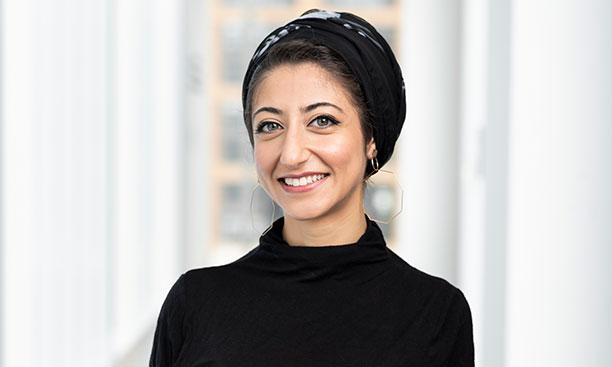
Rund Abdelfatah ’13 got her start in radio behind the scenes of NPR hits like TED Radio Hour and How I Built This. Now she’s in front of the mic for a new NPR podcast called Throughline. In each episode, Abdelfatah and co-host Ramtin Arablouei look at a historical event in an effort to understand how it’s affected the world today. Early episodes covered facets of the Korean War, protests by black athletes, and the militarization of the U.S.-Mexico border. The newest episode looks at the political rise of House Speaker Nancy Pelosi. Abdelfatah said that in crafting each episode, she draws on a lesson learned during her time as an anthropology major at Princeton: “I realized that every person, every place has a story.”
Light-bulb idea
“Ramtin and I started talking about how we were reading the news and it felt like a lot of the stories didn’t offer enough context — they didn’t dig deep enough. It’s really hard with the 24-hour news cycle to go in-depth on anything. We were both producers working on other podcasts and then one day, it just kind of came out of the blue: ‘Maybe we can do it.’ We were put into NPR Story Lab, and we were working on it nights and weekends between our day jobs, essentially. We just worked on it for like a year and a half. Then eventually we got greenlit, and we’re still working on it.”
THE PLAYLIST
Three more podcasts to check out this month
1. Author MICHAEL LEWIS ’82 looks at the evolving concept of fairness in his new series, Against the Rules.
2. On The Theatre Podcast, JARROD SPECTOR ’03 talks about his first Broadway role as Gavroche in Les Miserables and his recent work as Sonny Bono in The Cher Show.
3. Dr. LAURA FORESE ’83, the chief operating officer of NewYork-Presbyterian, discusses the future of women’s healthcare on Secrets of Wealthy Women, a Wall Street Journal podcast.
Escaping the daily news grind
“We’re not so wedded to the daily news. These episodes take a long time to produce — we do a lot of interviews for every episode, a lot of research, a lot of fact checking, a lot of production — so we’re working on these episodes ahead of time. We really are not trying to chase the news as much as just reflect on the things happening. We’re just trying to better understand some of those forces that are happening around us, or the ideas circulating that we might be thinking about or talking about, but don’t necessarily have a specific news peg.”
‘We’re not experts’
“We’re not trying to convince anyone that we’re experts, because we’re not. We’re curious journey-ers. We’re people who are interested in the news and current events, and who have a passion for learning more about the context behind these things, but we want it to feel like we’re learning as we’re going through the episode because we are. It’s really a privilege being able to work on a show like this because we let our curiosity lead us and we get to explore things that I’m sure a lot of people are interested in exploring.”
Complicating history
“Sometimes, the media can fall into recurring narratives about topics. It can sometimes be hard to see beyond that narrative, and I think if you have a more complicated understanding of it, then you’re not just defaulting to that narrative. If you are able to contextualize things and see things in a more detailed, humanized, individually focused way — rather than sweeping generalizations — you just come out of it with a deeper understanding of that thing. I think it creates more room for dialogue. And then when you see another headline that has to do with that topic, you can read it or listen to it or watch it with a little bit more sense of context and framing.”
Sound designing
“Ramtin and his band compose the music. When we set out to do this, we always knew we wanted it to be really highly produced, really sound-designed. That’s the thing that we love. History is inherently dramatic — it has gripping stories, it’s cinematic — and we always thought that it’s a shame to not bring to life those stories which already have so much depth to them as is. Sound designing is super fun and I think it’s as much a part of the whole experience of the episode as the information itself because it guides you. It’s what really helps propel the stories forward and hopefully helps the experience be more than just a series of facts.”
Making the show their own
“I know that my weirdness comes across in the show sometimes. And that’s all part of it. Every episode, we’re letting our curiosity guide us, we’re bringing our voices to the scripts. This is going to sound strange, but I see it as a little bit of an extension of who I am and who Ramtin is. We really kind of infused ourselves in the show so early on.”
Interview conducted and condensed by Anna Mazarakis ’16
Alumni, if you have a podcast that you’d like to share with PAW readers, please email us at paw@princeton.edu.
